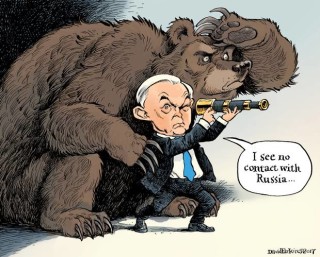Donald Trump has tried to strike a delicate balance with the selection of the top two officials to serve in his White House, capping off a weekend in which the president-elect and the people around him sent a slew of mixed signals about how he intends to govern.
He announced on Sunday that Reince Priebus, the chair of the Republican National Committee, will be his chief of staff. The appointment of the buttoned-down Wisconsin lawyer – an apparent indication of relative moderation and Mr. Trump moving closer to the Republican mainstream – is a potential irritant for the fiercely anti-establishment base that propelled Mr. Trump to victory.
But the president-elect also announced that his campaign chair, Stephen Bannon, will serve as his chief strategist and senior counsellor.
As chairman of Breitbart News, Mr. Bannon has been closely associated with and frequently provided a platform for the “alt-right” – a rogue wing of the conservative movement that wages war with perceived members of the political elite, trades heavily in conspiracy theories and offers an even more hard-line version of the anti-immigrant and racially charged messaging that Mr. Trump campaigned upon.
Despite the chief of staff considered the White House’s top backroom position, Mr. Bannon was conspicuously listed before Mr. Priebus in Sunday evening’s press release. Although described as “equal partners,” it appears likely that the former banker and film producer – credited for helping focus Mr. Trump’s message after stepping in during the summer – will have more clout in setting broad messaging and policy.
Mr. Priebus will presumably manage staff and reprise his campaign role as a bridge between Mr. Trump and other Republicans, especially in Congress.
But the uncertain balance of power and potential for friction between the two officials speaks to early ambiguities and tensions very much on display in other ways as well, as Mr. Trump tries to marry his polarizing campaign rhetoric with the demands of actually governing the country.
Such dynamics were especially on display this weekend as Mr. Trump and other Republicans attempted to shed light on the extent to which he will make good on his promises to crack down on immigration.
In a television interview on 60 Minutes, Mr. Trump said he will move swiftly after he takes office to deport or incarcerate as many as three million undocumented immigrants “who have criminal records.” After that, he said, the government will “make a determination” whether to do likewise with others who are not in the country legally.
On the same day that interview aired, however, House Speaker Paul Ryan said that neither the congressional Republicans that he leads nor Mr. Trump himself intend to create a “deportation force.”
“I think we should put people’s minds at ease: That is not what our focus is,” Mr. Ryan, a friend of Mr. Priebus’s and a frequent target of Mr. Bannon’s, told CNN. “We think that first and foremost, before we get into any other immigration issue, we’ve got to know who’s coming and going into the country – we’ve got to secure the border.”
Mr. Trump’s plan for stopping more migrants from entering the country illegally, in fact, was another source of mixed messages. Asked during the 60 Minutes interview whether he would make good on his signature campaign commitment to “build a wall” along the Mexican border, he responded in the affirmative. But then he qualified it by saying that “in certain areas, a wall is more appropriate” and in others “there could be some fencing.”
Again, other top Republicans appear to be outright contradicting what Mr. Trump said during the election, with former House Speaker Newt Gingrich – a key member of Mr. Trump’s transition team, and a possible member of his cabinet – acknowledging late last week that Mr. Trump would not deliver on his promise to somehow make Mexico pay for the wall, but “it was a great campaign device.”
Meanwhile, Mr. Trump and the people around him appeared to be struggling with whether to strike an aggressive or conciliatory tone toward protesters who have taken to the streets after his victory. Appearing on Sunday talk shows, former New York mayor Rudy Giuliani – another transition-team and possible cabinet member – at once dismissed them as “professional protesters” and said that “we understand their frustration,” days after calling them “crybabies.”
And the president-elect’s Twitter feed, which included a similar attack on protesters followed by praise for their “passion for our great country,” has provided a window into his broader tonal struggle. In recent days, Mr. Trump has alternately used it to make nice with past Republican adversaries who have called to congratulate him, and to air grievances with the “dishonest” New York Times for reporting his past comments on nuclear weapons.
Meanwhile, even after the appointments of Mr. Priebus and Mr. Bannon, there is uncertainty about how other staffing decisions and power balances will be affected by competition among various factions – among them Mr. Trump’s family, loyalists to former campaign manager Corey Lewandowski, comparatively experienced political staffers like Kellyanne Conway and public figures with large egos such as Mr. Giuliani and New Jersey Governor Chris Christie – which sparred during the campaign.
During a CNN discussion on Sunday, former media mogul Conrad Black suggested Mr. Trump’s more “outrageous” and “bombastic” lines about immigrants and others during the campaign should be dismissed as politics as usual, and by no means the bigot many saw him as.
Co-panelist David Remnick, the New Yorker editor-in-chief, seemed astounded. “When I hear him described as not a sexist, not a racist, not playing on white fears, not arousing hate, when he’s described in a kind of normalized way … I think I’m hallucinating,” he said.
ADAM RADWANSKI
The Globe and Mail
Published Sunday, Nov. 13, 2016 4:25PM EST
Last updated Sunday, Nov. 13, 2016 11:37PM EST

